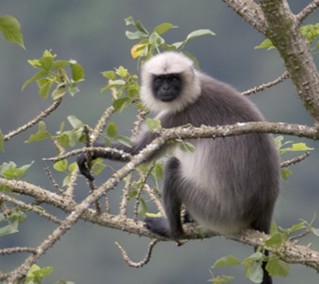|
Gray Langur (Genus: Semnopithecus) - wiki
| 제목: | Gray Langur (Genus: Semnopithecus) - wiki
| |

| 해상도: 319x284
파일크기: 25475 Bytes
등록시간: 2007:08:20 11:29:53
|
Gray langur
From Wikipedia, the free encyclopedia
[Photo] Black-footed Gray Langur Semnopithecus hypoleucos from the Western Ghats. Semnopithecus entellus hypoleucos or Semnopithecus hypoleucos. Langur photographed by Chaitra Ramaiah / Rajesh at Agumbe. Photographer contact kaadupaapa AT gmail.com
The gray langurs are a group of Old World monkeys and make up the entirety of the genus Semnopithecus. The species are large and fairly terrestrial, inhabiting open wooded habitats and urban areas on the Indian subcontinent. Until recently they were considered one species, Semnopithecus entellus; now seven distinct species are recognized. When only one species was recognized, it was also called the Hanuman Langur (named after the Hindu vanara divinity Hanuman), the Common Langur and the Entellus Langur. In Sri Lanka, it is natively known as the Wanderoo.
Description
They are largely gray, with a black face. In Indian mythology, this is because Hanuman, a monkey warrior, burnt his hands and face trying to rescue Lord Rama's wife. Males are up to 75 cm long, and females 65 cm. Langurs from the southern part of their range are smaller than those from the north.
Diet
Gray langurs feed on leaves, fruit, buds and flowers. Their diet, however, is highly seasonable, with mature leaves being eaten only as a fall-back food during the winter months. In the summer, especially before the monsoon season, they are highly frugivorous. They also supplement their diet with insects (up to 25% in some months), tree bark and gum.
Behavior and reproduction
Though they sleep in trees, they spend more time on the ground than any other known colobine species. They are diurnal and usually walk on all fours.
They live in medium to large groups, usually with one dominant male. Males do not hold the dominant position for long in a group, with the average being about 18 months. Adolescent males who are expelled from the group sometimes form 'bachelor' packs. These packs, after a time, start to harass the group that expelled them, and challenge the alpha for leadership of the pack. If an attack by a bachelor pack is successful and they are able to kill the alpha, they will engage in a power struggle, where first all of the infants fathered by the previous alpha are killed, and then the bachelors fight among themselves, killing each other until only one remains, who then becomes the leader of the pack.
Species list
Nepal Gray Langur, Semnopithecus schistaceus
Kashmir Gray Langur, Semnopithecus ajax
Tarai Gray Langur, Semnopithecus hector
Northern Plains Gray Langur, Semnopithecus entellus
Black-footed Gray Langur, Semnopithecus hypoleucos
Southern Plains Gray Langur, Semnopithecus dussumieri
Tufted Gray Langur, Semnopithecus priam
http://en.wikipedia.org/wiki/Gray_langur
| The text in this page is based on the copyrighted Wikipedia article shown in above URL. It is used under the GNU Free Documentation License. You may redistribute it, verbatim or modified, providing that you comply with the terms of the GFDL. |
|
^o^
동물그림창고 똑똑전화 누리집
^o^
|
|